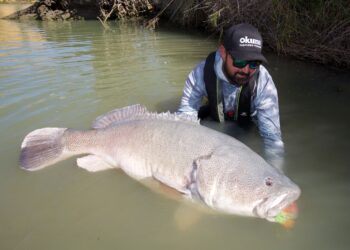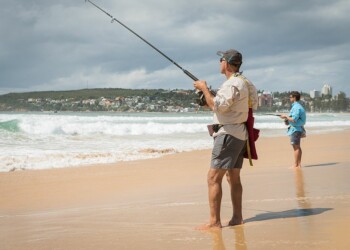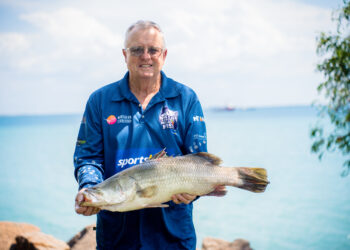
MOST anglers don’t know it but there’s quite an extensive, if informal, network of recreational fishing advocates across the English speaking world. We draw on each other’s ideas and experiences and seek to apply what’s relevant to the challenges we find at home.
When I spoke at your Recreational Fishing Conference in Darwin last November I highlighted good fishery management practices and advocacy from Britain and the USA that might help Australians grapple better with thorny issues such as marine parks and tone deaf politicians. And now, back home in the UK, I am busy waving examples from Australia and New Zealand in the faces of our own ministers as they consider what type of fishing future might exist outside of the European Union.
I didn’t vote for Brexit but there is no doubt that the EU’s Common Fisheries Policy (CFP) has been entirely commercially focussed from inception and that its biggest flaw has been prioritising short term earning opportunities rather than long term environmental responsibilities. The CFP does not even officially recognise recreational fishing as a valuable, valid and legitimate use of public fishery resources that is practiced by millions of EU citizens. In fact, EU fisheries management has a long history of failure punctuated at best by occasional mediocrity. Departure from the CFP does provide us with an opportunity for greater ambition with the goal of excellence in Marine fisheries management.
We are currently seeking to influence a new, post Brexit Fisheries White Paper in the hope that it will look to draw upon best practice from around the world which recognises recreational fishing and public access to fishing opportunities as legitimate stakeholders in the ‘catching sector’.
Economic and social value of recreational sea angling
I’ve said it many times before but know this truth. Politicians understand two things more than most – money and votes. And for recreational fishing advocates this means drumming into them just how much our sport is worth to the economy and how many people enjoy doing it.
Our surveys show that just shy of one million members of the British public go fishing at sea every year for recreation and to catch fish for their own consumption. That’s approximately 2 per cent of the entire UK adult population.
Sea angling brings with it many social, health and wellbeing benefits. For many children and young people it is often their first experience of interacting with the natural world.
Sea Angling 2012, the study of Recreational Sea Angling in England carried out for our Department of the Environment, shows that total resident sea angler spending in 2012 was estimated to be £1.23bn, equivalent to £831million direct spend excluding imports and taxes. This directly supported 10,400 jobs.
To put this into greater context, the first sale value of fin fish species caught commercially but which are also targeted by anglers is only £33m. Even with generous downstream, multipliers applied it is clear that public access to recreational fishing opportunities in the UK generate vastly more economic activity than commercial fishing.
In Europe
On a European level a recent report produced for the European Parliament stated that marine recreational fisheries were worth €10.5bn supporting an estimated 100,000 jobs. This is equivalent to 7 per cent of the annual EU budget of 145 billion euro or 0.07 per cent of the EU economy. It is roughly equivalent to the cost of the London 2012 Olympic Games. The 100,000 FTEs supported is almost four times the staff of the EU Commission. If this was a single company, it would be in the top 10 in Europe, in terms of number of employees, and the top 100 in the world. The report went onto propose that these figures should lead to the implementation of marine recreational fisheries as a sector that is targeted for development alongside commercial fisheries and aquaculture in Europe.
We have shown our ministers two shining examples of where these principles have been successfully adopted. In the USA the recreational striped bass fishery is now estimated to be valued at $6.5bn supporting an estimated 63,000 jobs and in Ireland, where sea bass is now a recreational only fishery, the worth to the Irish economy is put at 52 million Euros.
New Laws
Leaving the EU will mean adopting a raft of new fishery legislation the best example of which, in my view, is the USA’s Magnuson-Stevens Conservation and Management Act (MSCMA) which sets statutory targets for the rebuilding of threatened over fished stocks.
We are also pointing to the New Zealand Fisheries Act (1996) which governs fisheries management throughout New Zealand’s territorial waters. The purpose of the Act is “to provide for the utilisation of fisheries resources while ensuring sustainability”. There are three main categories of fishing activity which are managed under the legislation ─ commercial, customary – non-commercial and recreational. The NZ legislation enshrines into law the all important principle of sustainability and only allows for commercial exploitation once targets have established and the other two sectors have been allocated a share. This is in marked contrast to the current situation in Europe where fish stocks are allocated to commercial operators and quotas are bought and sold leaving recreational fishers to scrabble around for what is left.
We have, as well, held up the 30 or so recreational fishing havens that politicians in New South Wales had the foresight to introduce in return for a State recreational fishing licence that provided the revenue to fund the buy out of commercial nets. The same principle has been applied by the Victorians in Port Phillip Bay and recreational fishers will reap the benefit.
Whilst these State based measures from Australia are clearly successful and welcome the federal management of fisheries in Australia is less than impressive. You guys still need to get the balance right between conservation and access as the recent rows over Marine Parks have demonstrated.
We have to look to America for inspiration and there is no doubt that the Magnuson – Stevens Act (named after after Warren G. Magnuson, former U.S. senator from Washington state, and Ted Stevens, the former senator from Alaska) is a ground-breaking piece of fisheries legislation that forms the legal provision for promoting optimal exploitation of U.S. coastal fisheries.
Enacted in 1976, it has since been amended in line with sustainability policy
Regional councils of the National Marine Fisheries Service (NMFS) determine when a stock is overfished, and apply both regional and individual catch limits. The NMFS has implemented the Fish Stock Sustainability Index which measures key stocks according to their overfishing status and biomass levels. The Act was enacted to promote the U.S. fishing industry’s optimal exploitation of coastal fisheries by “consolidating control over territorial waters” and establishing eight regional councils to manage fish stocks. The act has been amended several times in response to continued overfishing of major stocks.
Magnuson – Stevens has seen 40 separate over exploited fish stocks successfully rebuilt. The USA is making good progress in ending over fishing in its federal waters, actively rebuilding stocks, and providing fishing opportunities for both recreational and commercial fishing and the communities which they support.
A fishing future?
I firmly believe it is in the UK’s long-term national interest to take an approach to managing our publicly-owned fishery resources which enshrines sustainable public access at the same time as recognising the immense economic and employment impacts recreational fishing has the potential to generate. We can do this by learning from our fishing cousins across the world and persuading our politicians to adopt the very best of what we know works.

















